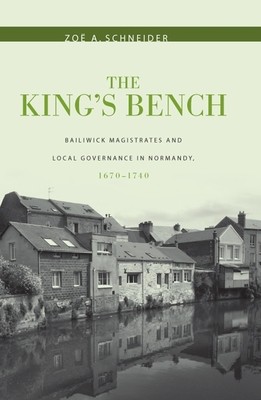
- We will send in 10–14 business days.
- Author: Zoë A Schneider
- Publisher: University of Rochester Press
- ISBN-10: 1580462928
- ISBN-13: 9781580462921
- Format: 15.8 x 23.1 x 2.8 cm, hardcover
- Language: English
- SAVE -10% with code: EXTRA
Reviews
Description
An examination of kings' courts and lords' courts in Normandy that opens a new chapter in the debate over absolutism, sovereignty, and the nature of the state in early modern France.
Hidden deep in the countryside of France lay early modern Europe's largest bureaucracy: twenty- to thirty-thousand royal bailiwick and seigneurial courts that served more than eighty-five percent of the king's subjects. The crowncourts and lords' courts were far more than arenas of litigation, in the modern sense. They had become the nexus of local governance by the middle of the seventeenth century, a rich breeding ground for men who controlled the villages, towns, and bailiwicks of France. Yet even as the centralizing state was reaching its zenith under Louis XIV, the king's largest permanent bureaucracy became increasingly alienated and cut adrift from the crown, many decades before the French Revolution.In The King's Bench, Zoë Schneider vividly brings to life the teeming world of the local courts, with their magistrates and jailers, townspeople and peasants. Together they contested that vital border where the private world of families and property collided with the public commonwealth. Schneider chronicles the transformation of local governance after the mid-seventeenth century, as judges and their courts became the face of public order in the countryside.
With this richly detailed local study of Normandy in the seventeenth and early-eighteenth centuries, Zoë Schneider opens a new chapter in the debate over absolutism, sovereignty, and the nature of the state in early modern France. Zoë A. Schneider has taught at Georgetown University and with the Smithsonian Institution in Washington, D.C.
EXTRA 10 % discount with code: EXTRA
The promotion ends in 20d.17:59:25
The discount code is valid when purchasing from 10 €. Discounts do not stack.
- Author: Zoë A Schneider
- Publisher: University of Rochester Press
- ISBN-10: 1580462928
- ISBN-13: 9781580462921
- Format: 15.8 x 23.1 x 2.8 cm, hardcover
- Language: English English
An examination of kings' courts and lords' courts in Normandy that opens a new chapter in the debate over absolutism, sovereignty, and the nature of the state in early modern France.
Hidden deep in the countryside of France lay early modern Europe's largest bureaucracy: twenty- to thirty-thousand royal bailiwick and seigneurial courts that served more than eighty-five percent of the king's subjects. The crowncourts and lords' courts were far more than arenas of litigation, in the modern sense. They had become the nexus of local governance by the middle of the seventeenth century, a rich breeding ground for men who controlled the villages, towns, and bailiwicks of France. Yet even as the centralizing state was reaching its zenith under Louis XIV, the king's largest permanent bureaucracy became increasingly alienated and cut adrift from the crown, many decades before the French Revolution.In The King's Bench, Zoë Schneider vividly brings to life the teeming world of the local courts, with their magistrates and jailers, townspeople and peasants. Together they contested that vital border where the private world of families and property collided with the public commonwealth. Schneider chronicles the transformation of local governance after the mid-seventeenth century, as judges and their courts became the face of public order in the countryside.
With this richly detailed local study of Normandy in the seventeenth and early-eighteenth centuries, Zoë Schneider opens a new chapter in the debate over absolutism, sovereignty, and the nature of the state in early modern France. Zoë A. Schneider has taught at Georgetown University and with the Smithsonian Institution in Washington, D.C.


Reviews